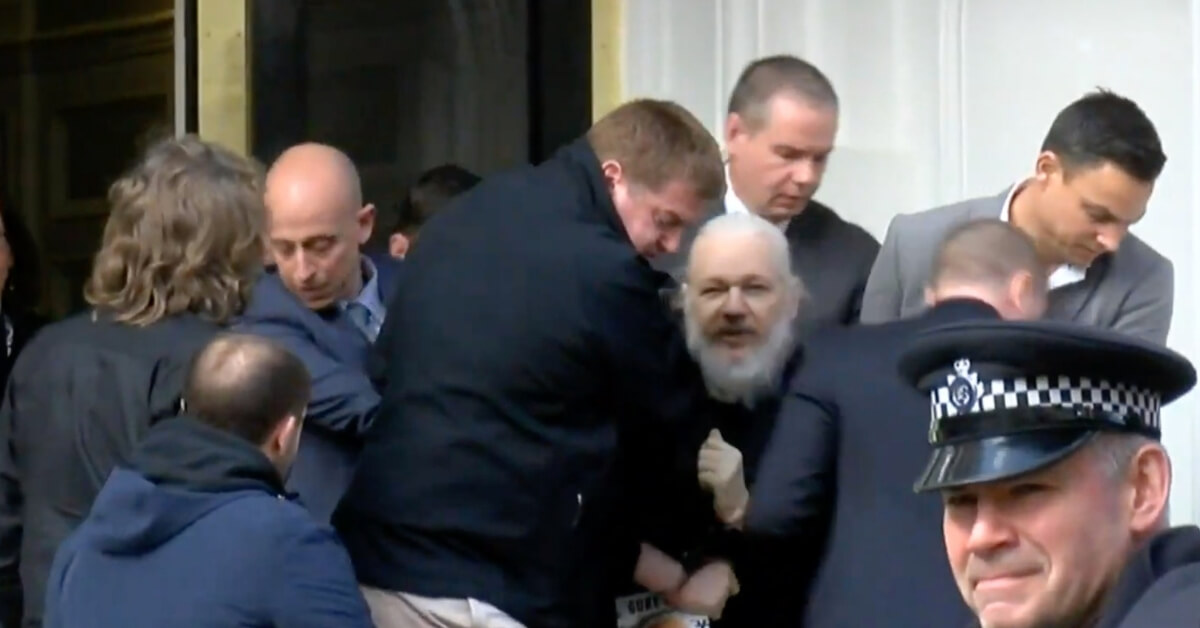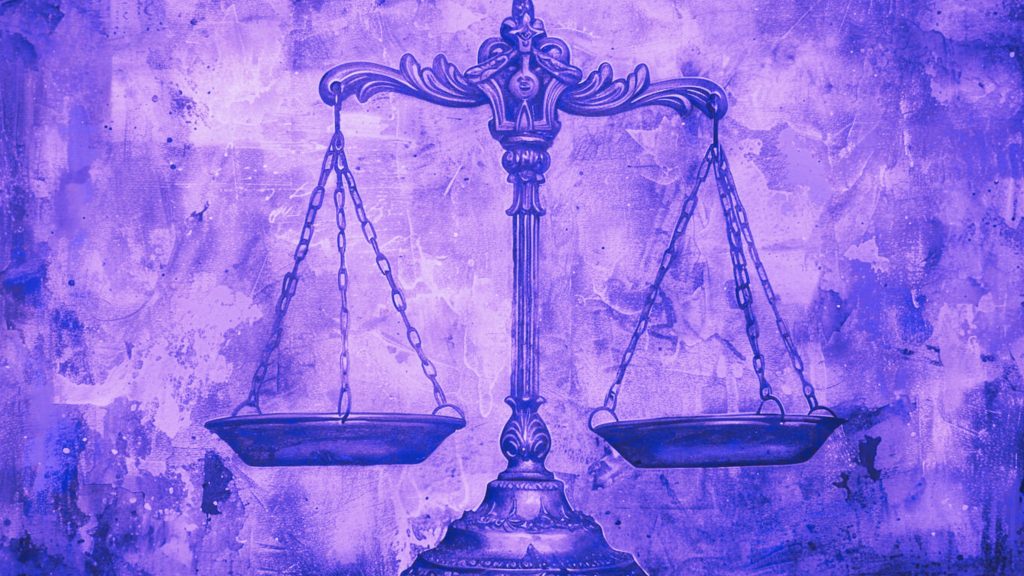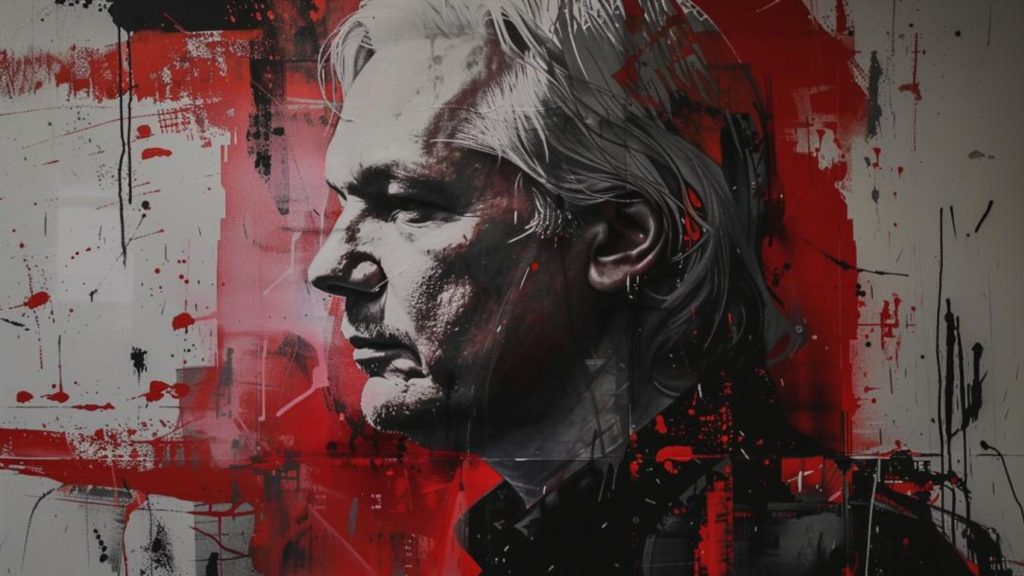As it had been rumored for the last week, the time for Julian Assange’s asylum in the Ecuadorian embassy in London is up. London police arrested Julian Assange today, after the Republic of Ecuador decided to withdraw Assange’s diplomatic asylum.
Just moments before his arrest, Ecuador President Lenin Moreno announced Ecuador had withdrawn Assange’s immunity:
Click here to display content from www.youtube-nocookie.com
Assange was dragged out of the Embassy in handcuffs by several Metropolian Police officers as shocked supporters and protesters watched on in dismay.
He is currently in police custody and is due to appear at Westminster Magistrates’ Court “as soon as possible”.
The WikiLeaks founder is famous for embarrassing the United States government by publishing documents and footage that showed atrocities in US military operations.
The London Police made a statement that Assange had been arrested by officers at the embassy on a warrant issued that was issued by Westminster Magistrates’ Court back in in 2012, for failing to surrender:
‘Julian Assange, 47, has today, Thursday 11 April, been arrested by officers from the Metropolitan Police Service (MPS) at the Embassy of Ecuador, Hans Crescent, SW1 on a warrant issued by Westminster Magistrates’ Court on 29 June 2012, for failing to surrender to the court.
‘He has been taken into custody at a central London police station where he will remain, before being presented before Westminster Magistrates’ Court as soon as is possible.
‘The MPS had a duty to execute the warrant, on behalf of Westminster Magistrates’ Court, and was invited into the embassy by the Ambassador, following the Ecuadorian government’s withdrawal of asylum.’
The official WikiLeaks Twitter account tweeted:
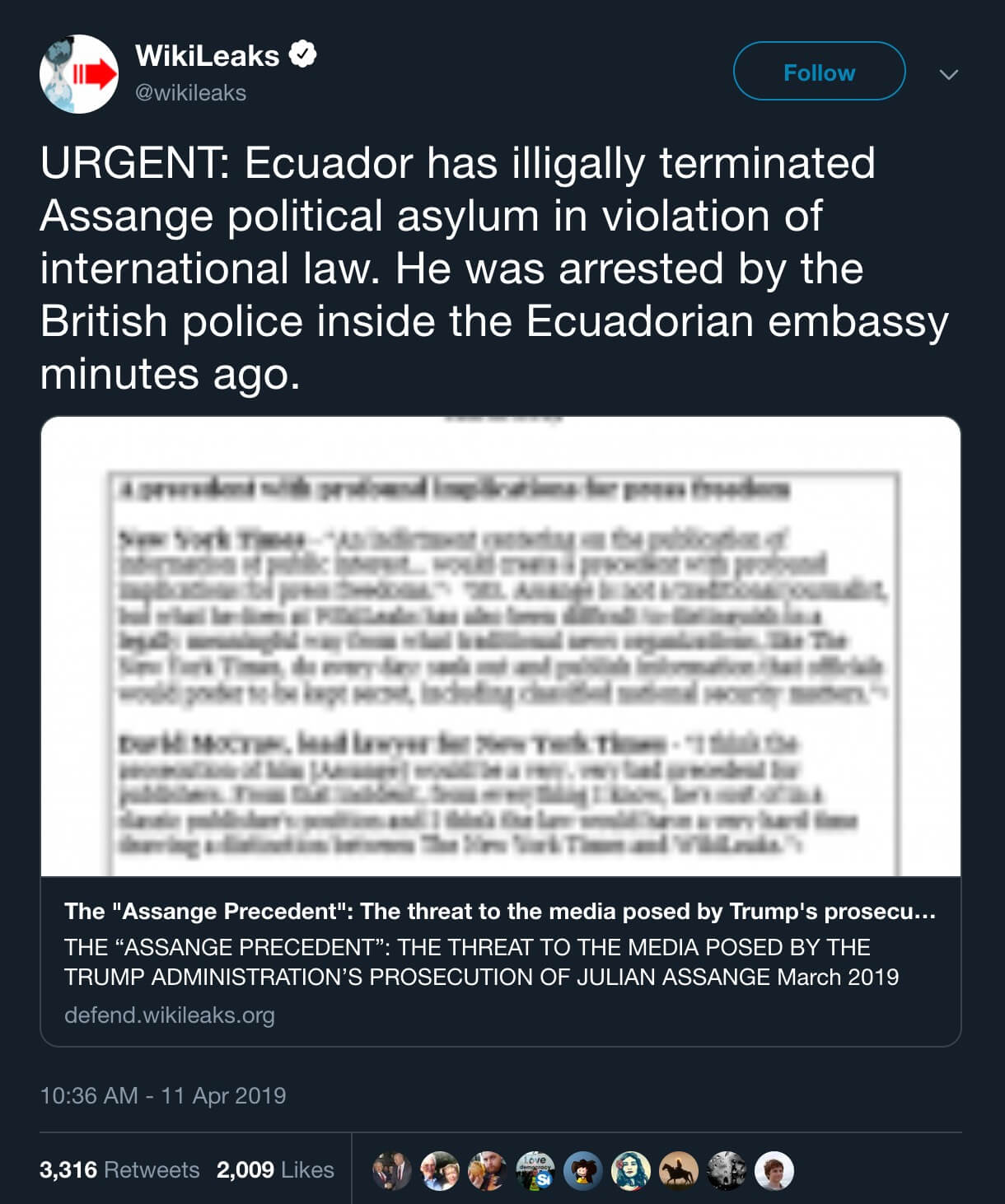
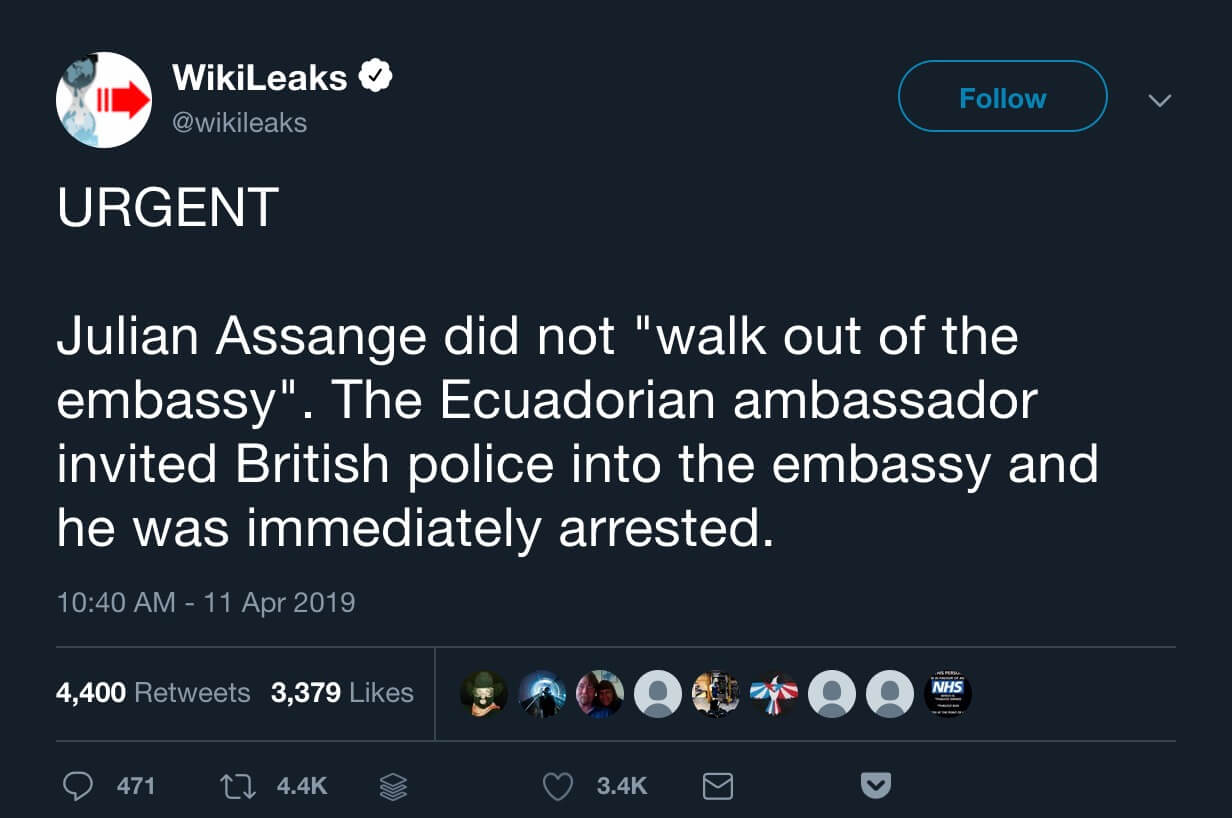
The United States Justice Department had secretly filed criminal charges against Assange back in November – however, they were accidentally made public. He also faces a charge in Great Britain ignoring the terms of a bail.
Recently, several news sources had reported that the Ecuadorian embassy in London was about to release Mr. Assange. The rumors gained traction as police units started gathering around the embassy earlier on April 5th. Just a couple of hours later, the streets in front of the embassy were hosting dozens of tents inhabited by passionate protesters who wanted to keep Assange safe from the grasp of the government.
The story was pretty much ongoing as more and more details become public. The crisis had cooled down notably when one of the Ecuadorian officials stated that Ecuador did not plan to expel the notorious whistleblower. Jaime Marchan, the ambassador for Ecuador, was briefly interviewed by a journalist from Chile Patricio Mery. The Ambassador stated: “There is no change in the Señor Julian Assange’s situation. To say we are going to take him out the embassy is an offense to Ecuador.” This now appears to have been a lie.
Mr. Marchan refused to give further comments and said that diplomatic asylum is a right and power of a sovereign state. Mr. Assange has been under the protection of Ecuador since 2012 when he was accused of rape by the Swedish police. Many political analysts suspect that rape allegations are just a sneaky attempt to cover up the real intent of those who want Assange behind bars.
Julian Assange’s legal team had reacted to the whole debacle immediately stating that forcefully removing Mr. Assange from the Ecuadorian embassy will be illegal. Obviously, the police will never try to break into a sovereign territory of another state. Embassies are recognized as parts of sovereign states abroad meaning that Mr. Assange is effectively on Ecuadorian soil as long as he remains inside the embassy.
However, today’s news that Ecuador have decided to remove immunity for Julian Assange, made the arrest possible.
Hundreds of protesters have showed up to support Mr. Assange in his seemingly endless battle against authorities. Prior to his arrest, protesters were calling for allowing him to walk out of the embassy without the fear of immediate arrest.
The situation gained much traction online. Thousands of tweets and calls from across the globe support Mr. Assange, and the discussion surrounding rape allegations and his current living conditions do not calm down.
Protesters are well organized and came to support Mr. Assange equipped with camping tents and posters. There was a call for “no expulsion” made with lit candles on the pavement right in front of the embassy.
Emmy Butlin, a vigorous supporter of Mr. Assange, told The Daily Mail that some supporters no longer believe that the Ecuadorian government is willing to protect Mr. Assange. She added that rumors about possible expulsion of the notorious whistleblower have been circulating ever since the change in the Ecuadorian government.
Lenin Moreno, the President of Ecuador, elected in 2017, changed the terms of Mr. Assange’s stay in the embassy. Several restrictions such as “no internet” rule were implemented immediately, although access to the internet was restored in 2018. Several other remarks over the past couple of years had indicated that the new president is less interested in protecting Julian Assange. This turned out to be true.
Several participants of the protest explained that they had just wanted to keep Julian Assange safe from the police and ensure that he is not in danger. Just like many others, they believe that rape allegations are either false or blown out of proportion and used as a way to lure Mr. Assange out.
It is not surprising to see so many people eager to support Mr. Assange amidst all this chaos. Protesters from all over the world show their support and send him best wishes.
There were numerous online events and meetings held in the US, UK, and other countries with people calling the whole situation a hoax. The internet has been quite vocal and united millions of Mr. Assange’s supporters into a cohesive unit with defined goals and inspired leadership.
However, public opinion is not as homogenous as some may think. In December of 2018, Ecuadorian citizens protested against allowing Mr. Assange to stay in the Ecuadorian embassy and called for the removal of his Ecuadorian nationality. Posters had slogans like “nationality is earned, not given!”
Ecuadorian refuge
On June 19, 2012, Mr. Assange sought refuge at the Ecuadorian embassy in London. He received political asylum and has been living in the embassy ever since. Most of his communications have been over the internet.
Rafael Correa, the president of Ecuador at the time, was rather welcoming of Mr. Assange and readily provided all necessary assistance to accommodate him as well as possible. The idyll was short-lived. In 2013, leaked political correspondence between Mr. Assange and multiple members of the Ecuadorian government indicated that Mr. Assange influenced some political decisions made by the Ecuadorian government.
Documents issued by the Ecuadorian government were unauthorized as said by Rafael Correa amidst the scandalous rumors that Mr. Assange was “running the show” in this situation.
Not everyone in Ecuador was happy about protecting Julian Assange. On multiple occasions, protests were organized in Ecuador to remove Mr. Assange from the embassy. The tension increased after Rafael Correa was replaced with Lenin Moreno as a result of the 2017 elections.
There are reasons why his stay is damaging to Ecuador. For example, intelligence operatives who supervise his activities cost Ecuador at least $4000 per month. Reportedly, two special agents have been living near the embassy in a flat paying a hefty £2800 rent. Juan Falconí Puig, the ambassador for Ecuador in 2014, complained about unpaid bills and expressed his discontent with Julian Assange.
WikiLeaks and its founder caused massive protests all over the world. It shows that many people are willing to go out in the streets and make their voices heard when it comes to transparency and truth about atrocities committed by the US government.
Mr. Assange revealed insightful information about war crimes committed by the US government. This information influenced the media landscape and made the public aware of horrific practices often employed by powerful governments. At the same time, many view the whole situation as a battle between those who want to quiet free speech and those who advocate for true freedom.
While millions were enraged after hearing about war crimes revealed by Julian Assange, some people believe that government secrets should stay secrets.
Nonetheless, the public opinion, in general, seems to be leaning to supporting Mr. Assange and his cause. Some British citizens think that their government should stop cooperating with the US altogether in regards to Mr. Assange’s situation.
The legal side of the “pickle.”
In August of 2010, Julian Assange visited Sweden to speak at the meeting of the Swedish Social Democratic Party in Stockholm. After his speech, he was invited to spend a night at Anna Ardin’s home by Mrs. Ardin herself. The 31-year old feminist and political activist was one of the organizers of the event in Stockholm.
On August 20, 2010, rape allegations from Mrs. Ardin and a 26-year old Sofia Wilen became public. Women accused Mr. Assange of rape and molestation. Mrs. Wilen reportedly had sex with Mr. Assange on August 16. The Swedish police quickly processed these accusations. At the same time, Mr. Assange who had already left the country commented: “The charges are without basis and their issue at this moment is deeply disturbing.”
Multiple people accused Mr. Arding of working with the CIA. These suspicions were more or less justified giving how rape allegations coincided with the beginning of the criminal investigation in regards to WikiLeaks and its founder. Eric Holder, the US attorney general at the time, said that the investigation is ongoing in November of 2010.
In November 2010, Marianne Ny, the director of public prosecution in Gothenburg, issued an order to detent Julian Assange on suspicion of rape and molestation. These accusations led to a series of appeals. However, the British government decided to extradite Mr. Assange as requested by Swedish authorities. Mr. Assange had to seek refuge in the Ecuadorian embassy where he remained until today.
Later in 2014, it was revealed that intelligence operatives suggested that Mr. Assange somehow established a secret communications network and gained access to computers in the embassy using them to contact his associates. All these activities certainly harmed the relationship built between Mr. Assange and the Ecuadorian government.
In October of 2018, Julian Assange threatened to sue the Ecuadorian government for violating his civil rights. The lawsuit was filed on October 19, 2018. It mentioned Jose Valencia, the current ambassador, as one of the defendants. Mr. Valencia stated that Ecuador will respond in an “adequate manner” and acknowledged that the lawsuit abides by international standards and Ecuadorian law. Note that Assange was given Ecuadorian citizenship in 2017 but wasn’t able to travel to Russia as a diplomatic representative because the UK refused to grant him diplomatic immunity.
This incident further escalated the tension between Assange and Ecuador. Considering recent developments in this story, concerns of Assange’s supporters are understandable.
Why is it important?
Mr. Assange is in the center of a heated political debate is that he represents free journalism and is seen by many as one of the last individuals who go against the system.
It is hard to deny that Mr. Assange is in a peculiar situation, especially following his arrest. He is attacked on all fronts. He did not leave the territory of the embassy for over six years. Lately, his communication options were limited. He is accused of treason and rape. He pretty much ran away from prosecution.
Many active users of the internet are on Mr. Assange’s side mostly since they see how speech policing affects their ability to express themselves freely. If Julian Assange falls victim to the system, many will lose hope in it.
Some may argue that there are similarities between this crisis and what is happening on the global political landscape right now. We talk about censorship and free speech. We discuss the extent to which speech should be policed. Amidst these debates, Mr. Assange’s situation stands out as an example of how one individual can be oppressed and taken down by those who he harmed with his journalism.
Julian Assange is a threat to the US government and many politicians including prominent figures like Hilary Clinton. His actions earned him fame and notoriety yet exposed him to criticism. Some journalists, perhaps, rightfully call him “attention-seeker” as he continues to criticize politicians and government actions, exposing the truth at all costs.
However, the battle between Assange supporters and the system is less about what he revealed. It is more about what he represents. His arrest now means there’s a threat to his safety so expect millions of supporters to rally behind him.
If you're tired of censorship and dystopian threats against civil liberties, subscribe to Reclaim The Net.

